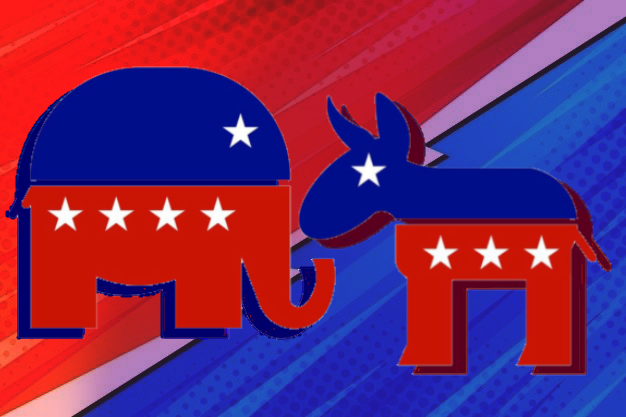Democrats, Republicans express beliefs through platforms
As the 2024 presidential election approaches, differences between the Democratic and Republican platforms have again come into public focus. These platforms are more than statements of principles–they are blueprints for America’s future. With Vice President Kamala Harris leading the Democratic ticket and former President Donald Trump returning as the Republican nominee, voters are presented with two starkly different visions for the nation. Understanding each party’s core values and goals is essential to making an informed decision, as the choices made today will shape our tomorrow.
The Democratic Party has been vocal in its defense of reproductive rights, championing access to abortion and other critical health care services. The Supreme Court’s Republican majority, created by Trump, historically overruled Roe v Wade, which the Democrats labeled as an extreme act that “had devastating consequences.” The party highlights that more than 20 states have imposed severe abortion bans, often without exceptions. They argue that such restrictions jeopardize the health and safety of millions of women.
Conversely, the Republican Party has softened its rhetoric on abortion since its hardline stance in 2016. Although they remain opposed to abortion, stating they “oppose late-term abortion, while supporting mothers,” recent statements are broader, focusing on state-level legislation rather than a national ban.
On civil rights, the Democratic Party has positioned itself as a defender of individual freedoms and diversity. They’re committed to fighting discrimination as part of a broader effort to combat systemic inequality, promising “Democrats will fight to make the Equal Rights Amendment the law of the land.”
Republicans support general civil rights, but express their specific opposition to issues like transgender rights and gender-affirming care. The GOP has a focus on safeguarding traditional values, stating “Republicans will end left-wing gender insanity.”
The parties present competing agendas on education too. Democrats advocate for strengthening public education and ensuring fair pay for teachers. They’re committed to expanding access to early education and ensuring affordable postsecondary education, which is seen as a way to address long-standing inequalities.
In contrast, Republicans argue for educational choice, supporting charter schools, vouchers, and alternatives to public education. The party states that “Republicans will ensure children are taught Reading, History, Science, and Math, not leftwing propaganda.” They call for an end to supposed left-wing influence in school curricula.
Voting rights too remain a key issue in the 2024 race. Democrats emphasize the importance of protecting voter access, pointing to the events of Jan. 6, 2021 as a reminder of the fragility of democracy.
The Republican platform, meanwhile, focuses on preventing voter fraud, advocating for stricter voter ID laws and efforts to combat illegal voting by non-citizens.
As the election nears, the ideological differences between the two parties couldn’t be clearer. From reproductive rights to civil liberties, education policy, voting access, and much more, the Democratic and Republican platforms offer different paths for the future of America. In such a critical election, staying informed and engaged is not just a civic duty, it’s a responsibility.

